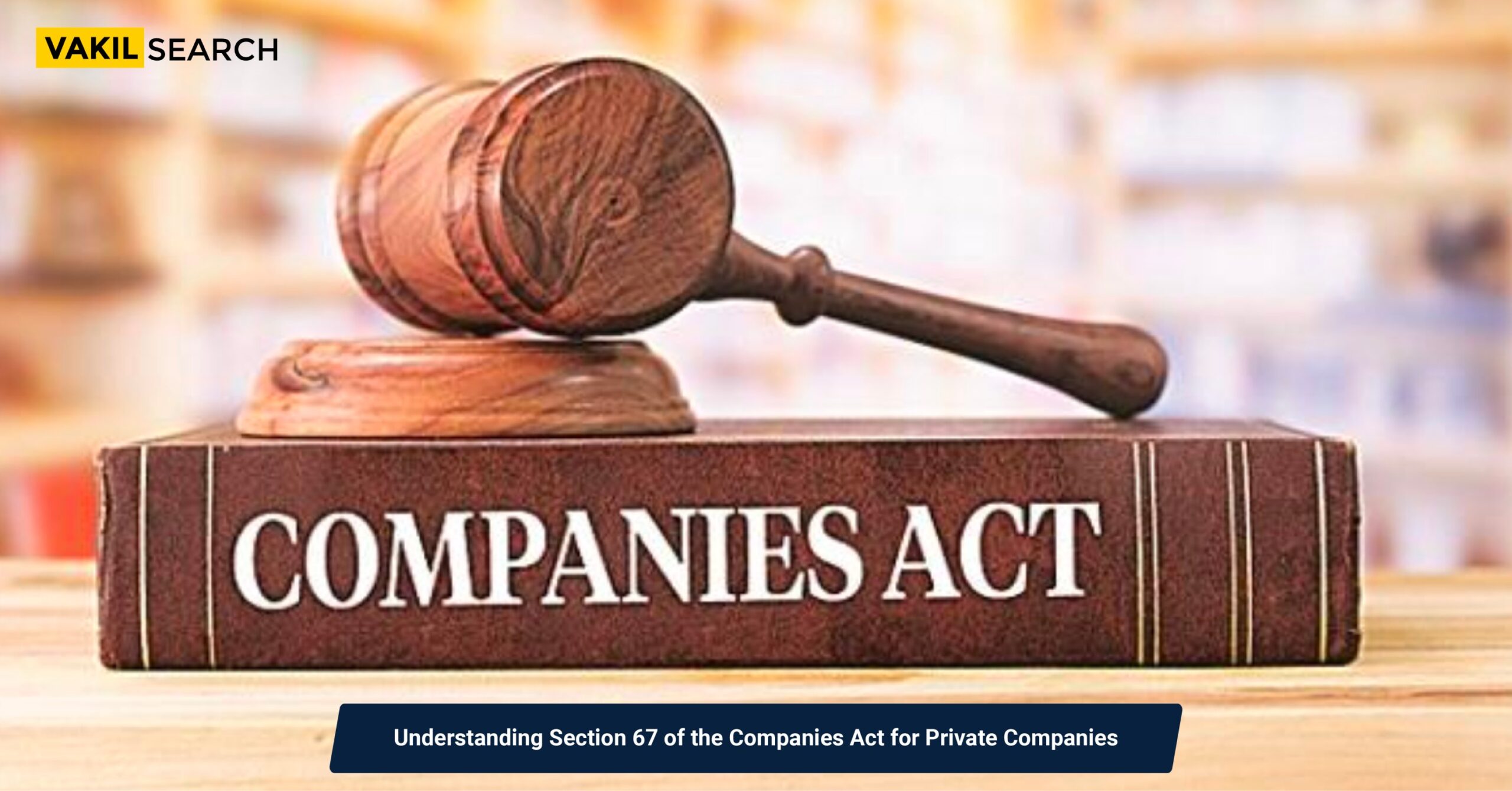Discover the intricacies of Section 67 of the Indian Companies Act, focusing on its significance for private companies, exemptions and the need for legal clarity in business transactions.
What is Section 67 of the Companies Act?
Section 67 of the Companies Act, 2013, deals primarily with the power of a company to buy its own shares and the restrictions placed on such actions. It also touches upon the provision of financial assistance by a public company for the purchase of its shares. Know about Section 67 of the Companies Act for Private Companies.
Let’s break down the key provisions of this section:
-
Restriction on Buyback of Shares
“No company limited by shares or by guarantee and having a share capital shall have power to buy its own shares unless the consequent reduction of share capital is effected under the provisions of this Act.”
In simple terms, this means that a private company cannot just buy back its own shares without following the procedures outlined in the Companies Act. Any reduction of share capital must be done in accordance with the law.
-
Prohibition on Financial Assistance
“No public company shall give, whether directly or indirectly… any financial assistance for the purpose of, or in connection with, a purchase or subscription made or to be made, by any person of or for any shares in the company or in its holding company.”
This provision prevents a public company from providing financial assistance to anyone looking to buy its shares. This is to maintain the integrity and transparency of share transactions.
-
Exceptions to the Rule
However, there are exceptions to the prohibition mentioned above:
(a) Banking Company Exception: A banking company can lend money in the ordinary course of business without violating this rule.
(b) Approved Scheme: A company can provide money for the purchase of fully paid-up shares in the company or its holding company if such a scheme is approved by the company through a special resolution and complies with prescribed requirements. This is often done for the benefit of employees.
(c) Employee Loans: Companies can give loans to their employees (except directors or key managerial personnel) to purchase fully paid-up shares, provided the loan amount does not exceed six months’ salary or wages.
These exceptions are important as they allow companies to engage in legitimate business activities without running afoul of the law.
-
Right to Redeem Preference Shares
Section 67 doesn’t affect a company’s right to redeem any preference shares it has issued. This means that a company can still redeem preference shares according to the provisions of the law.
-
Penalties for Non-Compliance
Lastly, the section imposes penalties for non-compliance. If a company contravenes the provisions of Section 67, it can be fined between one lakh rupees to twenty-five lakh rupees. Additionally, officers of the company responsible for the violation can face imprisonment for up to three years and fines ranging from one lakh rupees to twenty-five lakh rupees.
Understanding Section 67 of the Companies Act for Private Companies
The Companies Act, of 2013, is a crucial piece of legislation that governs the operations of companies in India. Within this legal framework, Section 67 holds particular significance, especially for private companies.
Section 67 of the Companies Act, 2013, lays down strict guidelines concerning a company’s ability to repurchase its own shares. It serves as a safeguard to protect the interests of creditors and shareholders while maintaining the company’s financial stability.
The Purpose of Section 67
At its core, Section 67 aims to ensure that a company’s share capital remains intact and available as a financial resource for creditors, should the need arise. The concept of “capital maintenance” is fundamental here, as it safeguards the rights of creditors who have extended financial support to the company.
Analysis of the Provision
The first sub-clause of Section 67 stipulates that a company cannot repurchase its shares unless it adheres strictly to the provisions of the Act. This stringent requirement underscores the significance of maintaining the company’s share capital.
While Section 68 of the Act provides exemptions for buy-backs, it’s important to note that a company can also repurchase its shares if it complies with the criteria outlined in Section 66 regarding share capital reduction. These criteria should not be confused with those governing the official procedure for decreasing a company’s share capital.
Restrictions on Financial Assistance
Section 67(2) of the Act imposes restrictions on public companies, prohibiting them from providing any form of financial assistance for the subscription or purchase of their own shares. This prohibition encompasses securities and guarantees, among other forms of assistance. Importantly, private companies are exempt from this restriction, a point of contention that we will explore further.
The 2015 MCA Notification & its Implications
In 2015, the Ministry of Corporate Affairs (MCA) issued a notification that exempted certain private companies from complying with Section 67 under specific conditions. These conditions include the absence of corporate shareholders, limited borrowings, and no defaults in debt repayment.
Critics argue that this exemption creates uncertainty regarding the application of the “financial assistance” restriction under Section 67(2). Moreover, it raises questions about the legality of such conditional exemptions.
Understanding Section 462(1) of the Act
To comprehend the legal basis of these exemptions, we must examine Section 462(1) of the Act, a provision absent in the old Companies Act of 1956. This section grants the government the power to issue notifications exempting specific provisions from applying to certain classes of companies in the interest of public welfare.
Final Thoughts
The complexities surrounding Section 67 of the Companies Act, especially as it pertains to private companies and financial assistance, are far from resolved. With evolving business transactions and investments, clarity on the validity and scope of exemptions is essential.
It is incumbent upon the Ministry of Corporate Affairs to provide a clear stance on this matter to ensure legal compliance and facilitate smoother operations for private companies.
Read more:-










